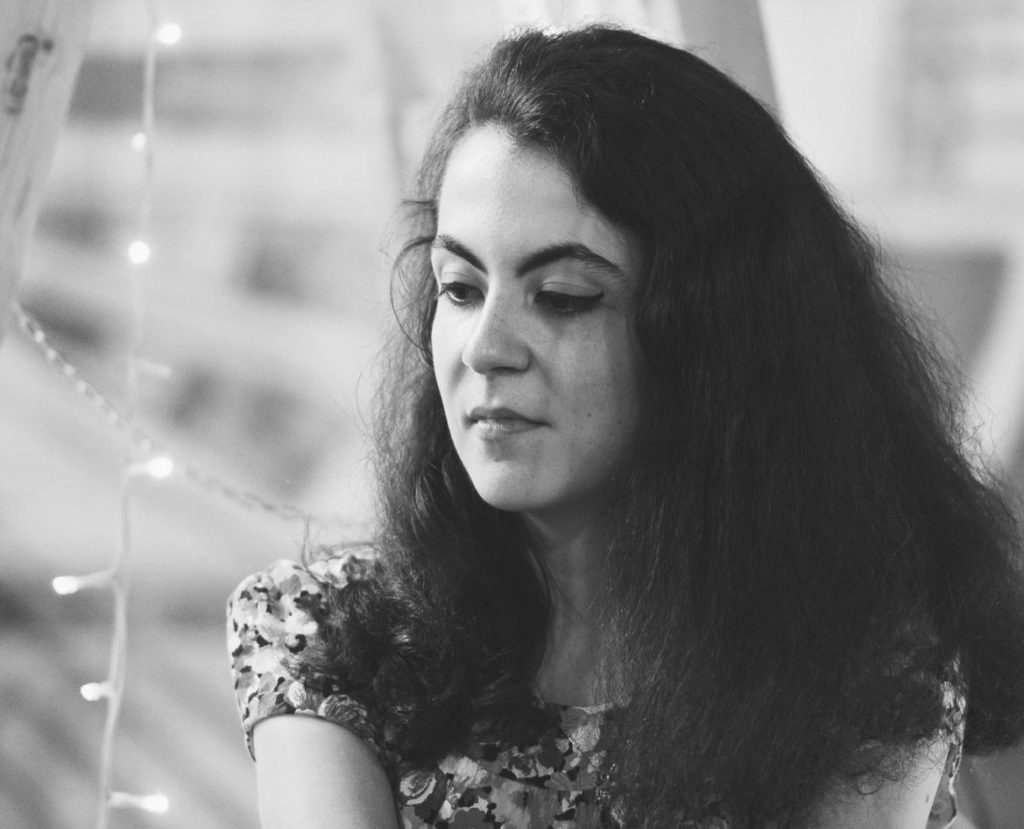
For Two Weeks Now
For two weeks now
I don’t sit huddled by the phone
for someone else to keep me away from sadness
I no longer wrap and unpack
the knees in my house dress
like two pieces of rancid butter
the cut hairs are gone
and the bruises
I used to give myself
so as not to vomit deformed animals every night
in the lap of a man
I can only hear the water dripping
on the conditioned brain
my Chinese drop
for a single woman in her 30s
the evening voice is the greatest danger
may cause chest irritation
erysipelas and lupus
can atrophy the brain to size
of a green walnut
in which bitterness increases
can julienne cut the silence
till it stings
until you get to cry when you drop the teaspoon
with sugar on the floor
when he tells you about an abandoned reservation
following a massacre
when someone dares to love you
you end up recording disguised poems
some shiny stones sent into the ether
where the fall is slow and untouched
if you happen to listen to them
are the records of a little girl who
asks her aggressor
to take her home
.
De două săptămâni
De două săptămâni nu mă mai așez
ghemuită lângă telefon
ca să mă ferească altcineva de tristețe
nu mai împachetez și despachetez
genunchii din rochia de casă
ca pe două bucăți de unt râncede
au dispărut firele de păr tăiate
au dispărut și vânătăile pe care mi le
făceam singură
ca să nu vomit în fiecare seară animale diforme
în poala unui bărbat
mai aud doar cum picură apa
pe creierul condiționat
picătura mea chinezească
pentru o femeie singură de 30 de ani
vocea de seară e cel mai mare pericol
poate produce iritații la nivelul pieptului
erizipel și lupus
poate atrofia creierul până la mărimea
unei nuci verzi
în care crește amărăciunea
poate tăia julien liniștea până ustură
până ajungi să plângi când scapi lingurița
cu zahăr pe jos
când îți vorbește despre o rezervație părăsită
în urma unui măcel
când cineva îndrăznește să te iubească
ajungi să înregistrezi poeme travestite
niște pietre lucioase trimise în eter
unde căderea e lentă și fără atingeri
dacă se întâmplă să le asculți
sunt înregistrările unei fetițe care-și
roagă agresorul
să o ducă acasă
.
Someday Will Grow Thyme Bushes
the closeness to real and the increased pulse
when I feel the flesh on my arm and breast
a spongy sac
from which will grow someday thyme bushes
and rosemary
just as from the swallowed stone a tree grows
I hope the little bushes will infuse for a while
the earth
to turn it into an aromatic salt
good to fill mouths
to sit on
the sparse hairs of the deerskin
in which I am
to be afraid to touch lest you
discover something new
a bump on the surface of the bark from which will
grow a black bud
a twig of helplessness and unfinished tasks
I count the moments of silence like alcoholics
keep counting their change
but in me multiply uncontrollably only
the benign cells
that remove healthy tissue, not
replace it
I have the image of the overgrown baby bird
pushing its half-brothers out of the nest
and it grows and grows
fed by an adoptive body
.
Vor creste candva tufe de cimbrisor
apropierea de real și pulsul mărit
când îmi palpez carnea de pe braț și sân
un săculeț spongios
din care vor crește cândva tufe de cimbrișor
și rozmarin
la fel cum din sâmburele înghițit se înalță un copac
sper ca tufele mici să infuzeze o vreme
pământul
să-l transforme într-o sare aromată
bună să umple guri
să se așeze pe
firele de păr rare ale pielii de cerb
în care sunt
să ți fie frică să te atingi ca nu cumva să
descoperi ceva nou
o umflătură la suprafața scoarței din care va
crește un mugur negru
un lăstar de neputință și sarcini neduse la capăt
număr momentele de liniște așa cum alcoolicii
își tot numără mărunțișul
dar în mine se înmulțesc necontrolat doar
celulele benigne
care îndepărtează țesutul sănătos, nu-l
înlocuiesc
am imaginea puiului prea mare care-și
împinge frații vitregi din cuib
iar el crește și tot crește
hrănit de un corp adoptive
Authors Bio and Translator’s Note
Andreea Apostu (b. 1990) is a research assistant at the Institute of History and Literary Theory „G. Călinescu”, the Romanian Academy and member of the ARCEN association.
She participated at the 218th edition of the Blecher Institute reading club, organized by Claudiu Komartin, and published poetry on the platforms “A Thousand Signs”, “Literomania” and in the magazines “EIGHT Reasons”, “Literomania” and “The Family”.
She has also written literary chronicles in “Time”, “Infinitesimal”, “Poesis International” and “Poetic Stand” and scientific articles in international collective volumes.
She frequently goes rogue in visual arts, being especially interested in post-impressionism and avant-garde.
Andreea Apostu has the quick pulse of small animals. She feeds her fears with sugar and French music, risking diabetes mostly because of the latter food. Otherwise, she is increasingly imagining things that are contradicted by reality.
I discovered, as a poet, the witty beautiful young lady, doctor of philological sciences, grace to Facebook: a talent breaking forth from the virtual space covered with empty words, causing the panic of authenticity of an original Van Gogh accidentally found among cheap fruit sketches and street pastels. I absolutely believe that her poetry belongs to the voices of the Romanian masters over the ages. I wish her a great career, a flourishing path in life and as much poetry as she could feel.
49 total views , 1 views today
